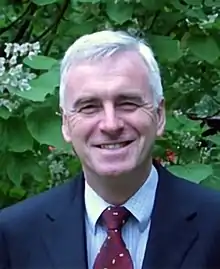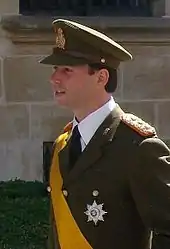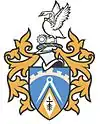Brunel University London
Brunel University London is a public research university located in the Uxbridge area of London, England. It was founded in 1966 and named after the Victorian engineer Isambard Kingdom Brunel. In June 1966, Brunel College of Advanced Technology was awarded a royal charter and became Brunel University. The university is often described as a British plate glass university.
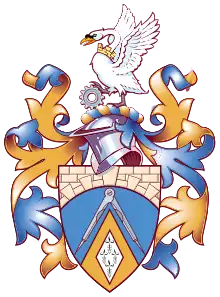 Arms of Brunel University London | |
| Type | Public |
|---|---|
| Established | 1966 – gained University Status by Royal charter 1962 – Brunel College of Advanced Technology 1928 – Acton Technical College 1902 – Shoreditch College of Education 1878 – Maria Grey College 1798 – Borough Road College |
| Endowment | £2.0 million (at 31 July 2015)[1] |
| Chancellor | Sir Richard Sykes |
| Vice-Chancellor | Julia Buckingham |
| Students | 14,790 (2018/19)[2] |
| Undergraduates | 11,125 (2018/19)[2] |
| Postgraduates | 3,665 (2018/19)[2] |
| 974 | |
| Location | Kingston Lane, Uxbridge UB8 3PH , England, United Kingdom 51°31′58″N 0°28′22″W |
| Campus | Suburban |
| Affiliations | Association of Commonwealth Universities European University Association |
| Website | www |
 | |
Brunel is organised into three colleges and three major research institutes, a structure adopted in August 2014 which also changed the university's name to Brunel University London. Brunel has over 12,900 students and 2,500 staff, and had a total income of £200.7 million in 2014/15, of which 25% came from grants and research contracts.[3] Brunel has three constituent Academic Colleges: College of Engineering, Design and Physical Sciences, College of Business, Arts and Social Sciences and College of Health and Life Sciences. The university won the Queen's Anniversary Prize in 2011. Brunel is a member of the Association of Commonwealth Universities, the European University Association, and Universities UK. The university is ranked as one of the top 400 universities in the world by QS World University Rankings 2021 and the Times Higher Education World University Rankings 2021.
History
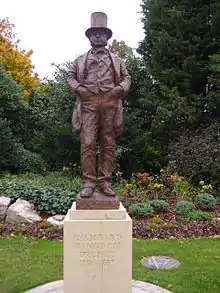
Origins
Brunel is one of a number of British universities which were established in the 1960s following the Robbins Report on higher education. It is sometimes described as a "plate glass university". The university's origins lie in Acton Technical College, which was split into two in 1957: Acton Technical College continued to cater for technicians and craftsmen, and the new Brunel College of Technology (named after Isambard Kingdom Brunel, the British engineer) was dedicated to the education of chartered engineers.
The campus buildings were designed in the Brutalist style of architecture by Richard Sheppard, Robson & Partners, Architects.
In 1960 Brunel College of Technology was awarded the status of College of Advanced Technology, and it was decided that it should expand at another site in order to accommodate the extra buildings that would be needed. Uxbridge was chosen to house the new buildings, and construction work hadn't even begun before the Ministry of Education officially changed the College's status: it was officially named Brunel College of Advanced Technology in 1962 – the tenth Advanced Technology College in the country, and the last to be awarded this title.
The Uxbridge (Vine Street) railway branch line was closed in 1964, and the college purchased the land adjacent to its site where the railway had run for £65,000 from the local council.[4]
1966 to present
The royal charter granting university status was awarded on 9 June 1966.[5] The university continued to use both campuses until 1971, when it left the Acton site.
In 1980, the university merged with Shoreditch College of Education, located at Cooper's Hill, Runnymede. This became Brunel's second campus. In 1995, the university expanded again, integrating the West London Institute of Higher Education, and adding campuses in Osterley and Twickenham. This increased the number of courses that Brunel University was able to offer. Traditionally the university's strengths were in engineering, science, technology and social sciences but with the addition of the West London Institute, new departments such as arts, humanities, geography and earth science, health and sports science were added, and the size of the student body increased to over 12,000.
Brunel has been the subject of controversy as its approach to higher education has been both market-driven and politically conservative. The decision to award an honorary degree to Margaret Thatcher in 1996, following the University of Oxford's refusal to do so, provoked an outcry by staff and students, and as a result the ceremony had to be held in the House of Lords instead of on campus. In the late 1990s, the Departments of Physics, Chemistry, and Materials Engineering were all closed, and, in 2004, the then Vice-Chancellor Steven Schwartz, initiated the reorganisation of the university's faculties and departments into schools, and closed the Department of Geography and Earth Sciences. The succeeding Vice-Chancellor, the sociologist Christopher Jenks, took office in 2006.[6] He was followed by Julia Buckingham, previously at Imperial College London, who took up the position of Vice Chancellor at Brunel in 2012.[7]
In June 2011, Brunel University licensed Creative Barcode, an automated idea sharing platform which protects ownership of early stage ideas.[8] The name was changed to Brunel University London by a supplemental charter dated 16 July 2014.
Campus

In the late 1990s Brunel devised a 10-year, £250 million masterplan for the campus. This involved selling off campus sites at Runnymede, Osterley and Twickenham and using the revenue from the sales to renovate and update the buildings and facilities on the Uxbridge campus. Works carried out included a library extension, a state-of-the-art sports complex, renovated students' union facilities, a new Health Sciences teaching centre, and the construction of more halls of residence.
The Brunel campus (especially those buildings in the 1960s 'Brutalist' architectural style) has appeared in several films, most famously in Stanley Kubrick's A Clockwork Orange, large parts of which were filmed on campus. It has also featured in several UK television series including Spooks, Silent Witness, The Sweeney and Inspector Morse.[9]
Organisation and governance
Colleges
Brunel has three constituent Academic Colleges:
- College of Engineering, Design and Physical Sciences
- [10]
- Brunel Design School
- Chemical Engineering
- Civil and Environmental Engineering
- Computer Science
- Electronic and Computer Engineering
- Mathematics
- Mechanical and Aerospace Engineering
- College of Business, Arts and Social Sciences
- [11]
- Arts and Humanities
- Brunel Business School
- Brunel Law School
- Economics and Finance
- Education
- Social and Political Sciences
- College of Health, Medicine and Life Sciences
- [12]
- Brunel Medical School
- Health Sciences
- Life Sciences
Research Institutes
Research at Brunel has been organised into three institutes:
- Institute of Energy Futures
- Institute of Environment, Health and Societies
- Institute of Materials and Manufacturing
Governance
Brunel exists by virtue of a royal charter first granted in 1966 and it has the status of an exempt charity as defined by the Charities Act 2006.[13]
The governing body of Brunel is the Council, which comprises university staff and students and independent members. The Council appoints the Vice-Chancellor and other senior officers. The Council has a number of Committees which support its work.
The current Chancellor of the university is Sir Richard Sykes, a biochemist and former Rector of Imperial College London. The Vice-Chancellor since 2012 is Julia Buckingham, formerly Professor of Pharmacology at Imperial College.[14]
Brunel's academic governing body is the Senate, which is chaired by the Vice-Chancellor. The Senate has a number of Committees which support its work.
Finances
In the financial year ended 31 July 2011, Brunel had a total income (including share of joint ventures) of £178.5 million (2009/10 – £169.47 million) and total expenditure of £172.36 million (2009/10 – £163.79 million).[15] Key sources of income included £69.83 million from tuition fees and education contracts (2009/10 – £64.51 million), £55.92 million from funding body grants (2009/10 – £57.55 million), £14.81 million from research grants and contracts (2009/10 – £12.57 million), £0.65 million from endowment and investment income (2009/10 – £0.6 million) and £37.29 million from other income (2009/10 – £34.25 million).[15] During the 2010/11 financial year Brunel had a capital expenditure of £18.8 million (2009/10 – £6.63 million).[15]
At year end of 2011, Brunel had endowment assets of £2.01 million (2009/10 – £1.59 million), reserves of £140.31 million (2009/10 – £130.83 million) and total net assets of £177.46 million (2009/10 – £170.2 million).[15]
Coat of arms
The Brunel Coat of Arms was granted to the University in 1966 and incorporates various images representative of the University's heritage and principles. For example, the masonry arch symbolises Isambard Kingdom Brunel, the compass and cogwheel symbolise technology, the ermine lozenge is an allusion to the Arms of Lord Halsbury, the first Chancellor of the University, and the crest of the swan symbolises Uxbridge.[16]
Academics
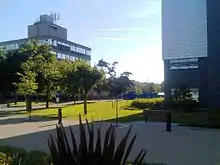
Brunel students have access to specialist laboratories for electronic imaging, bioprocessing and experimental techniques; flight, driving and train simulators; a 3-D body scanner; an MRI scanner; motion-capture equipment; an occupational therapy suite; sports and performing arts facilities; and academic archives in cult film and contemporary writing.[17]
Depending on the degree course followed, many undergraduate students may choose to undertake practical placements and projects as an integral part of their courses (a founding principle of the sandwich degree structure).
Research
In the 2008 Research Assessment Exercise (RAE), 90% of Brunel research submitted was rated as being of international quality.[18] In the 2014 RAE Brunel was ranked 33rd for Research Power.[19]
Courses at Brunel draw on staff's research in areas including Cancer Genetics, Environmental Science, Human-Centred Design, Materials Processing, Contemporary Music and Digital Performance, Children's Education and Sports Medicine.[17]
Made in Brunel
Brunel's Department of Design holds a yearly design exhibition called Made In Brunel,[20] to promote and showcase the work of final year students to the design industry.[21] In past years it has been held at the Business Design Centre in Islington, and the Oxo Tower Wharf. From 2011 onwards the exhibition has been held at the Bargehouse, on the Southbank, London.
Rankings
| National rankings | |
|---|---|
| Complete (2021)[22] | 84 |
| Guardian (2021)[23] | 110 |
| Times / Sunday Times (2021)[24] | 88 |
| Global rankings | |
| ARWU (2020)[25] | 401–500 |
| CWTS Leiden (2020)[26] | 223 |
| QS (2021)[27] | 368 |
| THE (2021)[28] | 351-400 |
| British Government assessment | |
| Teaching Excellence Framework[29] | Silver |
Brunel performed well in the annual rankings of UK universities produced by The Guardian and The Times, in part due to its strong performance in the Teaching Quality Assessment (where Brunel received a score of 20/24 or better for every subject assessed). The Guardian and The Times ceased using the TQA to compile their rankings (they use the National Student Survey results instead) and therefore Brunel had fallen in both rankings. However, the university regained its league position in 2012 partly due to improved student satisfaction and spending on students. As a result, it was ranked 39th in the Sunday Times University Guide. In the 2013 Guardian University Guide, the university's national ranking rose to 44th. In the 2014/15 THES world university rankings, Brunel ranked 226-250 (shared), representing a sharp rise in rankings.[30] Brunel was ranked as the 93rd best university worldwide in the field of engineering and technology, 32nd among European institutions and 11th among British institutions according to THES world rankings.[31] In August 2014, Brunel re-entered the Academic Ranking of World Universities (ARWU) Shanghai Jiao Tong Rankings after a four-year absence at number 409 globally, and 34 in the UK.[32] Also, in 2015 Brunel was ranked 25th in Times Higher Education's 100 under 50 ranking of the top 100 world universities under 50 years old.[33] The university is ranked as one of the top 400 universities in the world by QS World University Rankings 2021 and the Times Higher Education World University Rankings 2021.
The university won the Queen's Anniversary Prize in 2011.[34]
Student life
Student recreational and general facilities
Brunel has a gym, spa, and running track with professional training and medical facilities. On campus there is also a pharmacy, a shop, one bar called Locos, a nightclub called Venue, and a café named "1966" after the year of the university's founding. Historically Brunel Student Hall and The Sports Barn were key venues for band tours in the 1970-90's with some of the biggest names in rock music including, Fairport Convention, Fleetwood Mac, The Who, Deep Purple, Genesis, ELO, The Kinks, Thin Lizzy, Joy Division, The Pretenders, The Specials, The Stone Roses. The Sex Pistols played the first gig their 'Never Mind the Bans Tour'[35] at Brunel on 16th December 1977.[36]
Union of Brunel Students
The Union of Brunel Students is the students' union of Brunel University.[37] The Union is based within the Hamilton Centre on the Uxbridge campus.
Among other services, the Union runs two venues on the Brunel campus: the Venue nightclub, Loco's bar.[38]
The Union is led by fourteen democratically elected staff from the student body - six Student Officers, four Standing Committee Chairs and six Working Group Chairs - supported by over thirty professional staff.[37]
The Brunel Times
The Brunel Times is Brunel University's official student newspaper. Before 2019, it was called Le Nurb,[39] which has Brunel spelt backwards. Before that, it was a magazine called Route 66, named after the different campus locations Runneymede, Osterley, Uxbridge and Twickenham, not after a bus route which supposedly ran through Brunel's campus along Cleveland Road.
The newspaper editorial team is made up of volunteer students and is funded by the Union of Brunel Students. Traditionally, the newspaper has held a left-wing bias and has published interviews with prominent political figures including Shadow Chancellor John McDonnell, a Brunel alum and MP for Hayes and Harlington.
Formula Student
Brunel was one of the first UK universities to enter the Formula Student engineering competition, an annual event in which universities from around the world compete in static and dynamic events using formula style racing cars designed and manufactured by students.[40] Brunel's Formula Student teams have won prizes in the annual competition every year since they first entered in 1999.
The Brunel Racing team is composed of undergraduate and postgraduate students, each being allocated an area of the car to develop.[41] Students on MEng Mechanical Engineering courses act as team leaders and manage BEng students throughout the year to ensure a successful completion of a new car each year. Brunel Racing were UK Class 1 Formula Student Champions in 2002, and were the leading UK team at Formula ATA 2005, the Italian Formula Student event. In 2006 Formula Student Event, Brunel Racing were also the highest finishing UK competitor using E85 (fuel composed of 85% ethanol and 15% petrol.)[42]
Student housing
Brunel's £250 million campus redevelopment programme, completed in 2008, refurbished existing halls and the built the new Isambard Complex. There are now 34 self-catering halls of residence on-campus, with a total of 4,549 rooms, including studio flats for co-habiting couples. Rooms are available for undergraduates, postgraduates, students with disabilities and co habiting couples. All rooms have network access.
Many of the halls of residence around the Uxbridge campus are named after bridges that Isambard Kingdom Brunel either built or helped to design; other halls are named either after him, or after other notable engineers or scientists. For example:
- Clifton Hall (named for the Clifton Suspension Bridge)
- Saltash Hall (named for the Royal Albert Bridge that crosses the River Tamar at Saltash)
- Chepstow Hall (named for the bridge across the River Wye at Chepstow)
- Fleming Hall (named for Sir Alexander Fleming)
- Faraday Hall (named for Sir Michael Faraday)
- Galbraith Hall (named for W R Galbraith, who designed the Kew Railway Bridge)
- Mill Hall (named for John Stuart Mill)
There are also three accommodation complexes: the Bishop Complex (Bishop, Kilmorey, Lacy and St Margaret's Halls); the Lancaster Complex (Lancaster, Stockwell, Southwark, Borough Road, Maria Grey and Gordon Halls); and the Isambard Complex (North, Meadow, Michael Bevis, Concourse, Stephen Bragg, West, Maurice Kogan, David Neave, Central, East, Runnymede, George Shipp, Trevor Slater, Shoreditch, Syd Urry, South and Brian Winstanley Halls).
Notable academics
- Professor of Creative Writing Bernardine Evaristo, was joint winner of the Booker Prize 2019[43]
- 2012 to present Will Self: Professor of Modern Thought
- Professor Heinz Wolff: Emeritus professor at Brunel University London founded the Brunel Institute for Bioengineering in 1983
- Fiona Templeton: Senior Lecturer in Drama
- Benjamin Zephaniah: Professor - Creative Writing
_(cropped).jpg.webp)
Vice-Chancellors of Brunel University
- 1966 to 1971: Dr James Topping
- 1971 to 1981: Dr Stephen Bragg
- 1981 to 1989: Professor Richard Evelyn Donohue Bishop
- 1990 to 2001: Michael Sterling
- 2002 to 2006: Steven Schwartz
- 2006 to 2012: Christopher Jenks
- 2012 to present: Julia Buckingham
Chancellors of Brunel University
- 1998 to 2012: John Wakeham, Baron Wakeham
- 2013 to present: Sir Richard Sykes
Notable alumni
Media, entertainment and the arts
- Ray BLK, stage name for Rita Ekwere, (English), singer-songwriter
- Shohreh Aghdashloo, (International Relations), actress
- Nick Abbot, (Psychology), radio presenter
- Rotimi Alakija, DJ, record producer and recording artist
- Hajaz Akram, actor
- Mark Bagley, comic book artist
- Carl Barât, (Drama, did not graduate), musician, The Libertines and Dirty Pretty Things
- Adam Benzine, (Multimedia Technology & Design), Oscar-nominated filmmaker and journalist
- Jo Brand, (Social Sciences and Nursing), comedian
- Dave Brown, photographer, graphic designer, professional ape The Mighty Boosh
- Hopewell Chin'ono, filmmaker and journalist
- Marko Ciciliani, composer and audiovisual artist
- Michael Dapaah (Drama), actor, writer and comedian
- Greg Davies, (English and Drama), actor and comedian
- Francis French, space historian
- Alizeh Imtiaz, (English and Film and TV Studies BA 2008), director and actor
- Tony James, (Mathematics & Computer Science 1974), musician
- John Watts, musician, Fischer-Z
- Lee Mack, comedian
- Sophie McShera, (Drama), actress
- Oreke Mosheshe, (Management and Law), actor, television presenter and model
- Archie Panjabi, (Management Studies 1996), actor
- Nathaniel Peat, (Mechanical Engineering, Advanced Manufacturing Systems), social entrepreneur, reality TV winner
- Claire Phillips, (Mechanical Engineering 1986), portrait artist
- Amber Rose Revah (Contemporary Performance), actress, House of Saddam and The Punisher (TV series)
- Bindya Solanki, (Drama), actor
- Beverly Naya, Nigerian Actress, stars in the No.1 Telenovela/Soap Opera in Africa, Tinsel (TV series)
- Lucy Verasamy, (Geography), weather forecaster
- Kaan Yıldırım, (Marketing), Turkish Actor
Politics and royalty
- Joyce Anne Anelay, Baroness Anelay of St John's, politician, Minister of State of the Foreign and Commonwealth Office
- Guillaume, Hereditary Grand Duke of Luxembourg, royalty
- John Leech (History and Politics), politician, MP for Manchester Withington
- John McDonnell, politician, Shadow Chancellor of the Exchequer
- Ralph Miliband, political theorist
- Ville Skinnari, (LLM), Finnish politician, Minister for Development Cooperation and Foreign Trade
- Reza Moridi, (MTech and PhD in Physics), Canadian politician
- Hamdullah Mohib, (PhD Computer Systems Engineering), Afghan politician and diplomat, Ambassador of Afghanistan to the United States
- Anastasios Papaligouras (Master's in Comparative European Law), Greek politician, former Minister of Justice
- Pekka Sauri (PhD 1990), Finnish psychologist, politician, writer and cartoonist
- Seng Han Thong (MBA 1993), Singaporean politician[44]
- Sarah Dines (Law), Conservative Party politician, MP For Derbyshire Dales (UK Parliament constituency)
- Rosena Allin-Khan (Medical Biochemistry ), Labour Party politician, MP For Tooting (UK Parliament constituency)
- Diana Johnson (Law), Labour Party politician, MP For Kingston upon Hull North (UK Parliament constituency)
- Jenny Chapman (Psychology), Labour Party politician, MP For Darlington (UK Parliament constituency)
- Rudi Vis (PhD Economics), Labour Party politician, MP For Finchley and Golders Green (UK Parliament constituency)
- Alec Shelbrooke (Mechanical Engineering), Conservative Party politician, MP For Elmet and Rothwell (UK Parliament constituency)
- John Tomlinson (Health Services Management), Labour politician and life peer
- Shailesh Vara (Law), Conservative Party politician, MP for North West Cambridgeshire
- Claire Ward (MA Britain and the European Union), Labour politician, former MP for Watford (UK Parliament constituency)
- Marina Yannakoudakis (BSc Government, Politics and Modern History), Conservative Party politician, MEP for London
- Abang Johari Openg, 6th Chief Minister of the State of Sarawak, Malaysia
- Gagan Sikand, Member of Parliament for Mississauga—Streetsville Constituency in Canada
Sports
- Tony Adams (Sports Science), footballer, former Arsenal and England captain and Portsmouth F.C. manager
- Eniola Aluko (Law), England Ladies footballer
- Ross Brawn, team principal for Mercedes Formula One team
- Mike Coughlan (Mechanical Engineering 1981), former Chief Designer for McLaren Formula One team
- James Cracknell (MSc Sport Science 1999), rower, Olympic gold medallist
- Abi Ekoku, former GB Lions rugby league manager, British discus champion and Bradford Bulls, London Broncos and Halifax winger
- Ben Gollings, rugby player, Captain of England Sevens, IRB Sevens Series all-time top scorer
- Elizabeth Hall (Physiotherapy), athlete
- Roger Hammond (Materials Science), cyclist
- Audley Harrison (Sport Sciences 1999), boxer, Olympic gold medallist
- Richard Hill (Geography and Sports Science), rugby player, 2003 Rugby World Cup winner
- Ali Ibrahim, Egyptian rower
- Catherine Murphy, athlete
- Beth Rodford (Sport Science), rower
- Michael Olowokandi, former NBA player, No.1 overall pick of the 1998 NBA draft
- Abiodun Oyepitan (Politics and Sociology), athlete
- Perri Shakes-Drayton (Sport Sciences 2011), athlete
- Tom Shanklin, rugby player, Lions tourist and Wales rugby union international
- Iwan Thomas, (Geography and Sports Science), athlete
- Chad Gould, (Sports Science), footballer
- Heather Fell, (Physiotherapy), Olympic Modern Pentathlete and Triathlete
See also
References
- "Financial Statements for the Year to 31 July 2015" (PDF). Brunel University. p. 46. Retrieved 31 October 2016.
- "Where do HE students study?". Higher Education Statistics Agency. Retrieved 1 March 2020.
- "Financial Statements | Brunel University London". www.brunel.ac.uk. Brunel University London. Archived from the original on 5 May 2016. Retrieved 27 April 2016.
- "Annual Report 2005" (PDF). Brunel University. 2005. Retrieved 5 May 2011.
- Mukerji, Siran (31 March 2010). Cases on Transnational Learning and Technologically Enabled Environments. IGI Global. p. 360. ISBN 978-1-61520-750-3.
- "Brunel University Appoints Professor Chris Jenks Vice-Chancellor". Brunel University. 15 February 2006. Archived from the original on 16 July 2011. Retrieved 5 May 2011.
- "Julia Buckingham to be next Universities UK president". Times Higher Education (THE). 15 March 2019. Retrieved 2 March 2020.
- "Creative Barcode - Home". Archived from the original on 9 August 2011. Retrieved 16 July 2015.
- "London's Top Brutalist Buildings". 24 May 2012.
- "College of Engineering, Design and Physical Sciences | Brunel University London". www.brunel.ac.uk.
- "College of Business, Arts and Social Sciences | Brunel University London". www.brunel.ac.uk.
- "College of Health, Medicine and Life Sciences | Brunel University London". www.brunel.ac.uk.
- "Brunel University: A Registered Charity". Brunel University. Retrieved 23 January 2012.
- "Prof Julia Buckingham to be the next Vice-Chancellor of Brunel University | Brunel University London". Brunel.ac.uk. 9 January 2012. Retrieved 27 June 2018.
- "Financial Statements 2010–11" (PDF). Brunel University. Retrieved 14 July 2012.
- "Coat of Arms". Brunel University. 6 April 2011. Archived from the original on 10 April 2011. Retrieved 5 May 2011.
- "Brunel University London". Retrieved 16 July 2015.
- "Research Assessment Exercise 2008". Brunel University. 15 March 2011. Archived from the original on 16 July 2011. Retrieved 4 May 2011.
- "Research Excellence Framework 2014 | Brunel University London". Brunel.ac.uk. 17 September 2015. Retrieved 16 October 2015.
- "Shows and Events". Made in Brunel. Retrieved 5 May 2011.
- "History". Made in Brunel. Archived from the original on 20 August 2011. Retrieved 5 May 2011.
- "University League Table 2021". The Complete University Guide. 1 June 2020.
- "University league tables 2021". The Guardian. 5 September 2020.
- "The Times and Sunday Times University Good University Guide 2021". Times Newspapers.
- "Academic Ranking of World Universities 2020". Shanghai Ranking Consultancy.
- "CWTS Leiden Ranking 2020 - PP top 10%". CWTS Leiden Ranking 2020.
- "QS World University Rankings 2021". Quacquarelli Symonds Ltd.
- "World University Rankings 2021". Times Higher Education.
- "Teaching Excellence Framework outcomes". Higher Education Funding Council for England.
- "World University Rankings 2014-15". Times Higher Education. Retrieved 16 October 2015.
- "Subject Ranking 2014-15: Engineering & Technology". Times Higher Education. Retrieved 16 July 2015.
- "Academic Ranking of World Universities - 2014 - Top 500 universities - Shanghai Ranking - 2014 - World University Ranking - 2014". Archived from the original on 19 January 2015. Retrieved 16 July 2015.
- "100 Under 50 Rankings 2014". Times Higher Education. Retrieved 16 July 2015.
- "Winners of the Queen's Anniversary Prizes announced". Retrieved 16 July 2015.
- "Sex Pistols – Live Brunel University 16.12.77". discogs. Retrieved 3 October 2018.
- "MORE MEMORIES OF THE SEX PISTOLS AT BRUNEL UNIVERSITY". record collector. Retrieved 18 December 2018.
- "About the Union". Union of Brunel Students. Retrieved 21 January 2012.
- "Social". Union of Brunel Students. Retrieved 19 July 2018.
- "Brunel University student to launch newspaper in memory of uncle and journalist David May | Media news". www.journalism.co.uk. 13 December 2019.
- "Formula Student". Institute of Mechanical Engineers. Retrieved 5 May 2011.
- "Brunel Racing". Brunel Racing. Retrieved 5 May 2011.
- Bevis, Marianne, ed. (2007). "Brunnel Link Newsletter 2007" (PDF). www.brunel.ac.uk. Retrieved 23 November 2017.
- bevaristo.com https://bevaristo.com/. Retrieved 14 August 2020. Missing or empty
|title=(help) - "Seng Han Thong". Parliament of Singapore. 2011. Archived from the original on 13 July 2012. Retrieved 14 July 2012.

